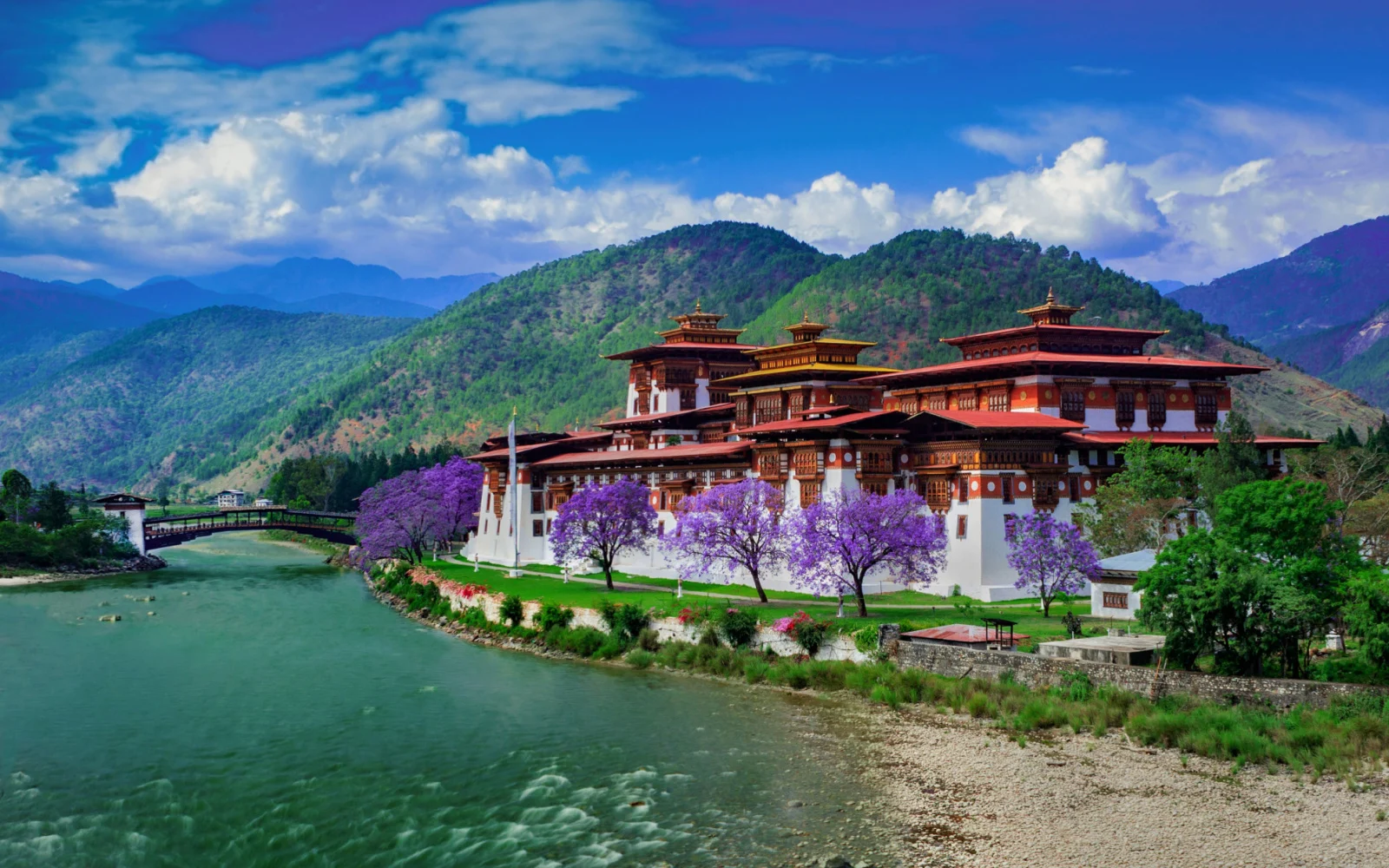Bhutan, nestled in the Himalayan mountains, is a fascinating yet remote country. Travel to this country is heavily regulated, but the few people who are able to go there are stunned by the beautiful landscapes and fascinating culture.
Nature is definitely one of the biggest draws in Bhutan thanks to its location in the spectacular Himalaya mountains.
Go on a guided trek in many beautiful locations such as the Bumthang Valley and Trashiyangtse. Be sure to check out some of Bhutan’s famous mountain monasteries, such as Tiger’s Nest or Punakha Dzong.
No trip to Bhutan is complete without getting to know the fascinating local culture through cuisine, craft markets, and traditional sports such as archery.
Most visitors to Bhutan don’t know much about the country since it is so remote, so they may be concerned about potential safety issues. Wondering about safety is normal, especially when traveling to an unknown destination.
But don’t worry — our travel experts did the hard work for you and created this detailed breakdown of safety when traveling to Bhutan that should give you peace of mind when planning your trip. let us be your guide!
Is Bhutan Safe to Visit in 2024?
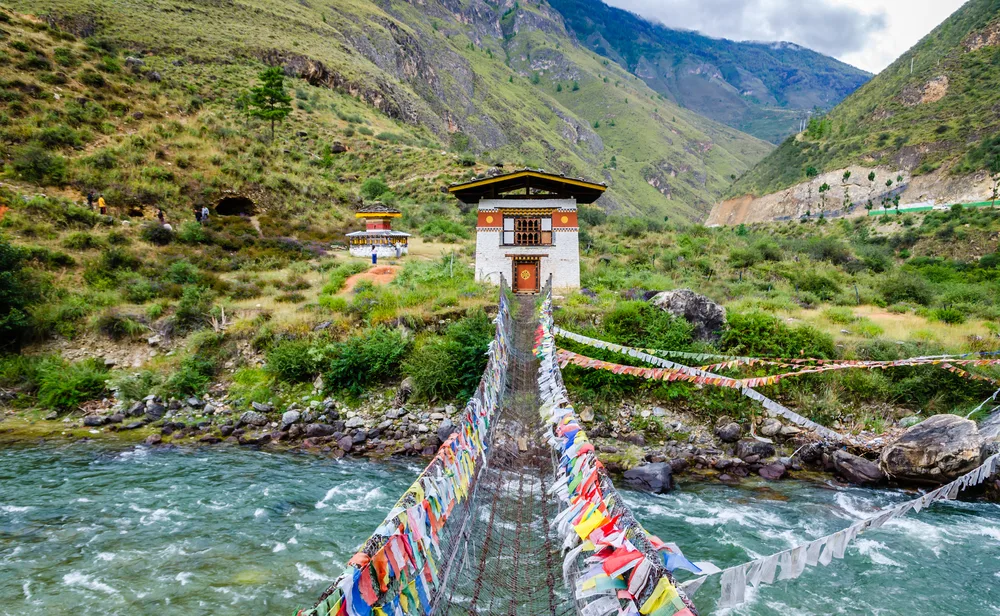
Sabine Hortebusch/Shutterstock
Yes. Bhutan is a very safe country to visit and, in fact, is one of the safest countries in the world! There have been some incidents of petty theft against travelers, but violent crime is rare.
The biggest danger to travelers comes from altitude sickness as the location in the mountains can affect travelers that are not used to such altitudes. International travel advisories mostly agree that Bhutan is a safe destination.
The United States only issued a Level One travel advisory for Bhutan, so as long as you take the same basic common sense safety precautions you would take at home, then your time in Bhutan should be safe.
New Zealand doesn’t even have a specific travel advisory for Bhutan in place. Bhutan often ranks as one of the safest, happiest countries in the world.
According to the Global Peace Index, it is the most peaceful country in South Asia and the 19th most peaceful country in the world. The Bhutanese government takes safety, security, and overall well-being very seriously.
It is the only country in the world that measures Gross National Happiness instead of GDP. Like any other country, Bhutan does have its problems.
Dangers you might run into include:
- Pickpocketing
- Bag snatching
- Vehicle break-ins
- Sexual harassment
Even these petty crime incidents are few and far between. The rate of violent crime is practically non-existent. One thing all travelers to Bhutan need to pay attention to is not running afoul of the local authorities.
Regulations for tourism are strict to prevent over-tourism and unsustainable development. Travelers have to pay $40 for a visa and a $200 daily sustainability fee, and fees for tours and entry into attractions recently increased.
Until 2022, travelers to Bhutan were required to book an official guided tour, but now you can also book directly with hotels (but you still need guides).
Another risk you should keep in mind is altitude sickness. Most cities and valleys in Bhutan are located at an altitude of about 5,000-7,000 feet, which is still very high.
Some treks to remote mountain areas go as high as 12,000 feet above sea level! Altitude sickness is common among tourists, so make sure you take precautions to avoid it.
Let your body adjust to the new altitude, so spend a few days leisurely exploring the cities and valleys before heading on any extensive treks.
Drink enough water, avoid alcohol, and eat light but filling meals. The NHS also has a list of medications that can help with the effects of altitude sickness, such as ibuprofen, acetazolamide, and anti-nausea medicine.
Besides keeping track of the entry requirements, the other main concern for travelers to Bhutan is the potential for natural disasters.
The most common disasters are landslides. During the monsoon rainy season, the steep terrain of Bhutan is vulnerable to landslides. The risk is highest in the country’s west, including around the capital Thimphu.
Avoid traveling to Bhutan during the monsoon season, which is usually from July to September, as that is when the risk of landslides is the highest.
Crime in Bhutan
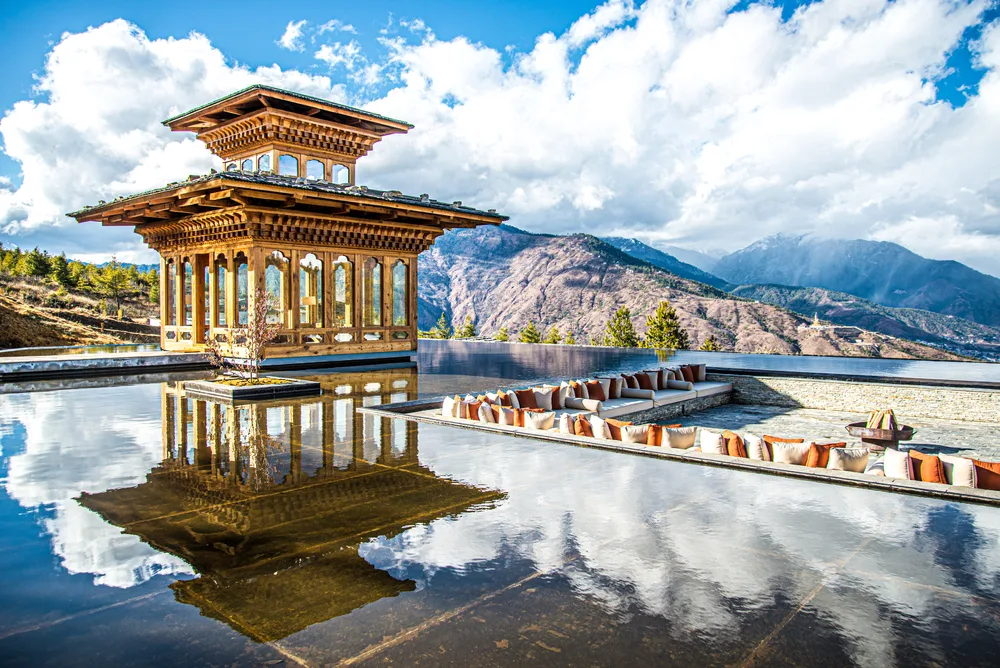
tonyzhao120/Shutterstock
The primary safety concern for most visitors when they go to a new place is crime. The perception of travel is that the second you leave your home, you are vulnerable to all sorts of criminals that like to target hapless tourists.
While some places live up to this stereotype of the dangers of traveling, others show that this perception is mostly stereotypical.
Bhutan is one of those destinations that shows that travel isn’t unsafe at all. The rate of crime in Bhutan is very low, and violent crime is practically non-existent. What crime does occur rarely affects tourists.
The violent crime rate in Bhutan is very low. According to World Bank data, the homicide rate in Bhutan is just 2 incidents per 100,000 people. The rates of other violent crimes are comparatively low.
The rate of property crime is slightly higher than the rate of violent crime, but it is still low compared to many other destinations around the world. According to Numbeo,
Bhutan scores a 35.94 out of 100 on the overall crime index, which is a low value. The most common crimes are forms of petty theft such as vehicle break-ins and street crime.
Although Bhutan has a reputation as a very safe, happy country, not everything is perfect. The crime rate is rising, particularly in the capital Thimphu, where crime rose 161% in 2017, to use one example.
Offenses against property were the most common, followed by drug-related crimes. The crime rise was driven by social factors such as more migration from rural areas to the city and high unemployment.
While this rise in crime is certainly concerning, even with a “crime spike,” Bhutan’s crime rate is lower than in much of the world.
Plus, since most travelers move through the country on a guided tour, you will always have a local on hand to help you navigate sketchy situations and generally insulate you from potential crime.
Pickpocketing
Of the few crimes that occur in Bhutan, the most common is pickpocketing and other forms of petty theft. While street crime is generally rare in Bhutan, it can occur in cities such as Thimphu and Paro.
The Canadian government cautions visitors about the rate of street crime in the Bhutanese capital. While the rate of pickpocketing is low enough that it is highly unlikely that you will be a victim, it’s still important to take a few precautions so that no crime affects your trip.
Some basic awareness as you move through crowded streets and markets is usually enough. The Irish government provides some general guidelines to help you identify which precautions you should take.
Make sure that your valuables are not all in one place and store some cash and an emergency card away from your main wallet in case you get robbed.
It’s also a good idea to make photocopies of your passport and visa to keep in a safe place and to store online in case something happens.
Even though Bhutan is a very safe country, it’s not a good idea to leave any of your valuables unattended. Since most thefts are crimes of opportunity, the best prevention is to not give potential criminals the opportunity to steal from you.
You don’t need to invest in a money belt or other secure bag, but just keeping valuables in your bags and pockets should be enough to prevent most thefts.
Burglaries
While burglaries are rare, they occur often enough for the Australian government to warn against them in the official travel advisory for Bhutan.
As with petty theft, the rate of burglaries is low, and you can easily defend against them with some precautions. Break-ins can affect accommodation and vehicles.
When you book your trip with an official guided tour, you know that the hotels and homestays they select will have a good reputation. If you are self-booking, which travelers to Bhutan now have the option to do, carefully research the hotels you are choosing.
Do the same for tour operators if you opt for a guided tour as well, choose an operator that is registered through the Tourism Council of Bhutan. Vehicle break-ins are also becoming more common around Bhutan.
You don’t have to worry about this as much as tourists renting their own vehicles is very strictly regulated in Bhutan.
However, if you are going around the country with a driver, make sure that you all remember to lock your doors and roll up the windows and not to leave any valuables visible in the car.
Avoiding Bad Areas
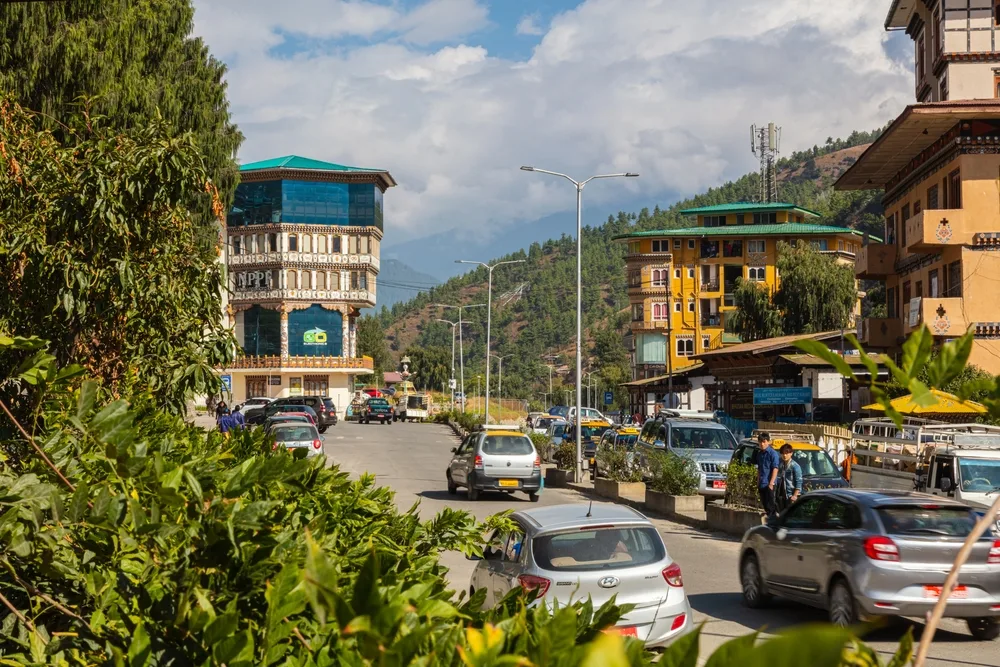
Thimphu, Bhutan – October 28, 2021: Street view Thimphu. Traditional architecture in the Bhutanese city. Cars driving on the street and people crossing the road. Less traffic in the capital of Bhutan/Holger Kleine/Shutterstock
There are no areas of Bhutan that are bad, especially when compared to other countries. The crime rate is higher in Thimphu, which makes sense since it is the biggest city.
Some locals advise people to be careful around the town of Phuentsholing, which is a border town between Bhutan and India.
Due to its location on the border, it is a prime location for smuggling and some illegal activity, such as the drug trade. The crime rate is still nothing to be concerned about, but just keep an eye out when you are there.
Things to Consider
Here are a few other safety tips to keep in mind when going to Bhutan:
- Road conditions, especially outside of the big cities, are poor. Driving at night is exceptionally dangerous so make sure that your guide doesn’t try to get somewhere faster by driving after dark. The roads get worse during the rainy season and the risk of landslides is high.
- Some female travelers have reported unwanted attention from their male tour guides, but these cases are few and far between and sexual harassment is rare. Bhutan is a matriarchal society in many respects so politely declining is usually enough to fend off unwanted sexual attention.
- Smoking tobacco is banned in Bhutan, although foreigners are allowed to import a maximum of 200 cigarettes if they pay a 200% tax and only smoke in private. Other drugs are also illegal, and penalties are severe.
- Dress codes for visiting dzongs or monasteries are very strict. Not only should arms and legs be covered, but you also cannot wear jeans, unzipped jackets, or garments tied around your waist. Be respectful of local customs as Buddhism is very important to Bhutan’s people.
Frequently Asked Questions
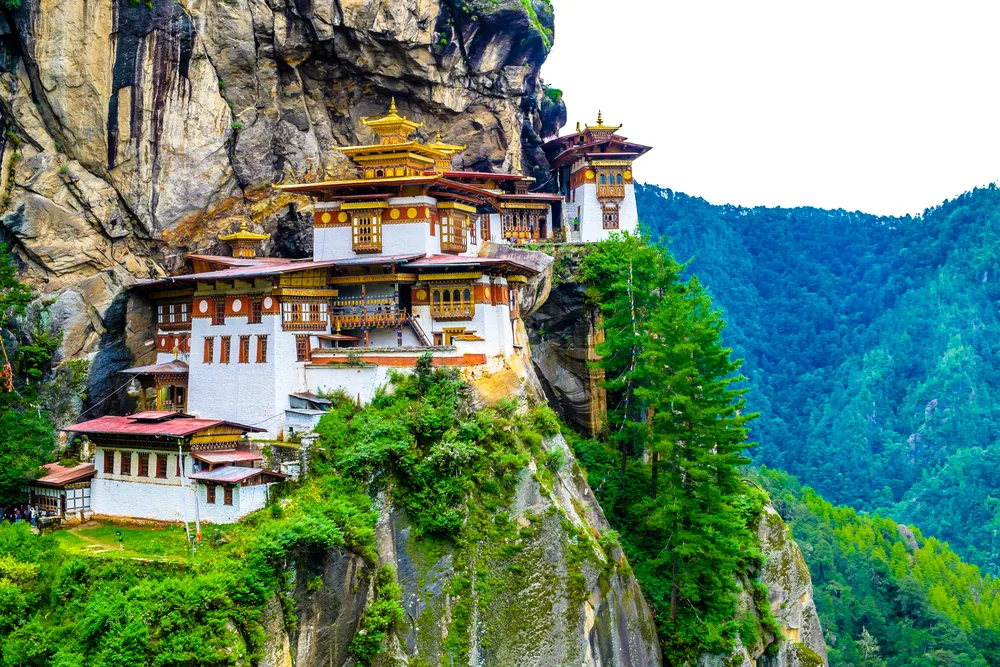
MC_Noppadol/Shutterstock
Here are a few of the most common questions other travelers had about Bhutan:
What is not allowed in Bhutan?
Drugs are not allowed at all in Bhutan, and smoking tobacco is limited and only allowed for foreigners. Don’t litter as laws against pollution are very strict, and single-use plastic bags are rarely allowed. Drinking or selling alcohol on Tuesdays is also not allowed.
Is Bhutan tourist-friendly?
Bhutan is tourist-friendly in the sense that most locals are friendly and welcoming to tourists. However, the government’s regulations are not friendly to tourists as they are very strict. The priority is sustainability, not attracting tourism.
Is traveling to Bhutan expensive?
Traveling to Bhutan is expensive — it may be one of the most expensive countries to visit in the world. Unless you are a visitor from neighboring India, you have to pay a daily sustainability fee of $200.
Additionally, recent changes to the payment structure mean that all tour prices and entrance fees are no longer included or regulated.
Why is Bhutan strict on tourism?
Bhutan is not strict on tourism because the government wants to give tourists a hard time, but because the country wants to avoid many of the problems associated with over-tourism. Strictly regulating tourism entries prevents environmental degradation and protects the traditional way of life.
Can you wear shorts in Bhutan?
While legally you can wear shorts in Bhutan, it is not the most practical choice. You can’t enter religious sites with your legs exposed, so you will need to pack a cover-up, and you will stick out from most of the country as people mostly dress modestly.
So, Is Bhutan Safe to Visit?
Bhutan is one of the safest places in the world to visit as the crime rate is very low. Once you jump through the various entry requirements, you’ll have a great time visiting. So what are you waiting for — book your trip to Bhutan to see all that the country has to offer today!



